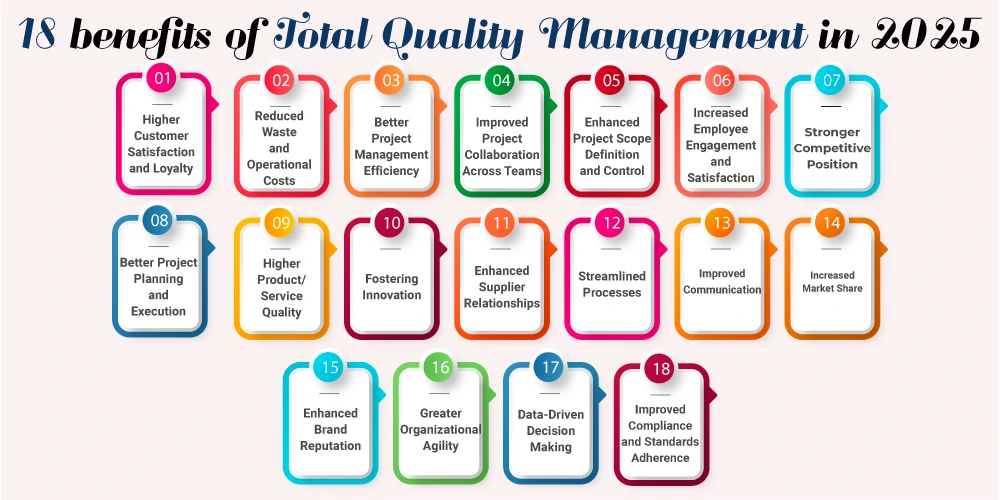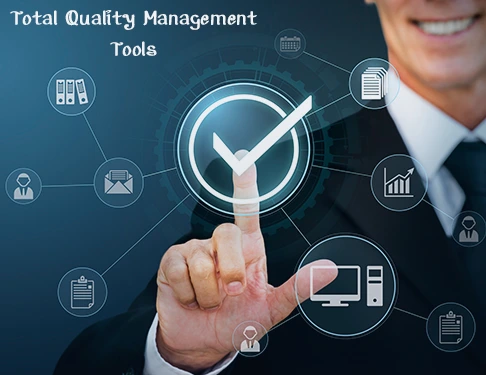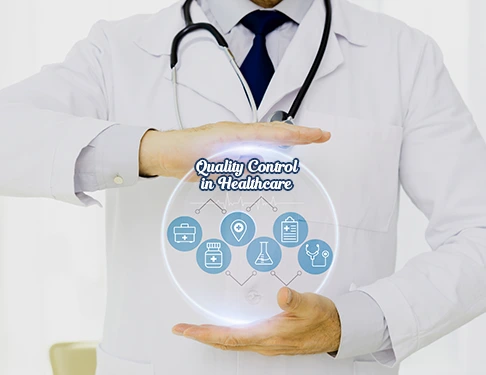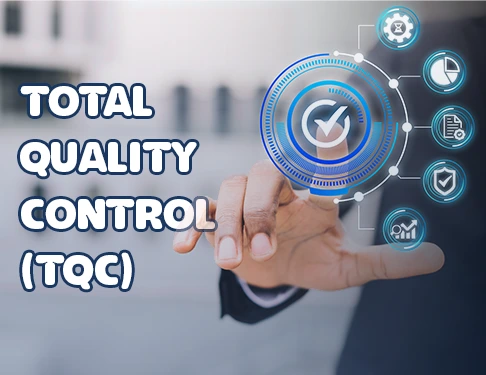Total Quality Management Tools
Total Quality Management (TQM) is a comprehensive approach aimed at improving the quality of products and services. It involves all members of an organization in the process of continuous improvement. TQM....
By AMREP | Posted on April 04, 2025

Total Quality Management (TQM) is a business philosophy that prioritizes quality in every aspect of an organization. TQM is more than just a set of practices; it is a culture, a way of thinking that values continuous improvement, customer satisfaction, and the involvement of all employees in the quality process. By focusing on long-term success through improving processes, products, and services, TQM offers numerous benefits to organizations of all sizes.
Below, we delve into these benefits in detail, explaining how TQM contributes to business excellence.
Total Quality Management (TQM) is an organization- wide approach to improve and sustain quality across all aspects of a business. TQM shifts the responsibility for quality to every individual in the organization — from the CEO to every frontline employee.
The origins of TQM can be traced back nearly a century to studies conducted at Western Electric’s Hawthorne Works. Researchers discovered that involving employees in decision-making and problem-solving led to significant improvements in productivity and morale. The concept gained further traction in the 1950s when quality experts like Edwards Deming and Joseph Juran introduced statistical control methods and quality management techniques to Japan, helping the country’s industries achieve remarkable advancements.
What initially began as a manufacturing-focused approach has since evolved into a comprehensive management philosophy applied across diverse sectors. Today, industries ranging from healthcare to software development incorporate TQM principles to drive continuous quality improvement, minimize waste, and enhance overall efficiency.
Read More: Total Quality Management Vs Six Sigma
Total Quality Management (TQM) is a comprehensive approach to improve organizational performance. Here are the key principles of TQM:
| Principle | Description |
|---|---|
| Customer Focus | Meeting or exceeding customer expectations by understanding and addressing their needs. |
| Leadership | Providing vision, direction, and culture that promote quality at all levels of the organization. |
| Engagement of People | Involving all employees in decision-making, idea generation, and problem-solving to ensure ownership and commitment. |
| Process Approach | Focusing on improving processes, not just end results, to reduce variability and enhance productivity. |
| Improvement | Continuously striving for improvements in processes, products, and services through data-driven decisions. |
| Evidence-based Decision Making | Making decisions based on data, analysis, and facts rather than assumptions or gut feelings. |
| Relationship Management | Building long-term, mutually beneficial relationships with suppliers, customers, and partners. |
| Systematic Approach | Managing interrelated processes as a system to optimize the overall performance of the organization. |
Read More: Effective TQM Practices and Strategies for Business Success
Here are key benefits of TQM that highlight how its principles help organizations enhance quality, improve efficiency, and stay competitive in 2025.

At the heart of TQM is the commitment to meeting and exceeding customer expectations. By focusing on delivering high-quality products and services, TQM helps businesses build strong relationships with their customers. This customer-centric approach leads to:
As businesses deliver better customer experiences, customer satisfaction naturally increases, which in turn enhances brand loyalty. Satisfied customers are more likely to become repeat buyers and recommend your business to others, fueling growth.
TQM helps organizations identify inefficiencies in their processes and minimize waste. By continually monitoring and improving operational procedures, businesses can streamline their activities and reduce unnecessary costs. Key areas where TQM reduces waste include:
By cutting down waste and enhancing efficiency, organizations can reduce operational costs, leading to greater profitability over time.
TQM’s emphasis on continuous improvement and quality management can significantly enhance project management processes. With TQM practices in place, projects become more streamlined, and project managers are better equipped to:
In turn, projects are more likely to be completed on time, within budget, and according to scope, all while meeting the highest quality standards.
A fundamental principle of TQM is that everyone in an organization plays a role in ensuring quality. This philosophy fosters a culture of collaboration among teams. TQM facilitates:
This collective approach to quality management leads to more successful collaborations, smoother workflows, and more efficient project execution.
TQM practices can also improve how project scope is defined, monitored, and controlled. With TQM’s focus on continuous feedback and quality assurance, project managers can:
By controlling the project scope and ensuring that it remains aligned with the desired outcomes, organizations can minimize risks and keep projects on track.
TQM encourages employee involvement at all levels. Employees are empowered to contribute to decision-making, identify areas for improvement, and take ownership of their roles. As a result:
When employees are engaged and satisfied, they are more productive, loyal, and likely to contribute to the overall success of the company.
A key benefit of TQM is its ability to help businesses gain a competitive advantage. Companies that focus on quality management are better positioned to:
By delivering consistently high-quality products and services, organizations can differentiate themselves in a crowded marketplace, making it easier to attract and retain customers.
TQM promotes a disciplined approach to planning, execution, and monitoring, which leads to more successful project outcomes. Through TQM:
By improving both the planning and execution phases, organizations are more likely to complete projects on time, within budget, and to the expected standards of quality.
Ultimately, the most significant benefit of TQM is the improvement in product or service quality. By embedding quality into every process—from design and production to delivery and customer service—companies achieve:
Better quality means fewer returns, lower customer complaints, and a stronger market presence. It also leads to increased customer satisfaction and loyalty, ensuring long-term success for the business.
By encouraging a culture of continuous improvement, TQM fosters an environment where employees are motivated to think creatively and come up with new ideas. This mindset helps organizations innovate and develop new products, services, and solutions that meet customer needs.
TQM promotes collaboration with suppliers to ensure the quality of materials and services provided. Stronger relationships with suppliers lead to:
TQM involves regular process reviews and optimization, which helps in streamlining workflows and eliminating redundant activities. This leads to more efficient processes, reducing the time spent on non-value-adding tasks and improving overall productivity.
TQM encourages transparent communication across all levels of the organization. Regular feedback loops, meetings, and data sharing ensure that everyone is aligned and working toward the same goals. This leads to:
Consistent product quality and customer satisfaction drive brand loyalty, which can help companies increase their market share. By continually improving their offerings through TQM, organizations can capture new customers and retain existing ones, positioning themselves as industry leaders.
A strong commitment to quality management builds trust with both customers and stakeholders. As TQM fosters the delivery of high-quality products and services, it enhances a company’s reputation, leading to a more positive public image and increased brand equity.
Organizations that adopt TQM are more agile and responsive to market changes. By encouraging continuous improvement, TQM enables businesses to adapt to new trends, customer demands, and technological advancements quickly, giving them a competitive edge.
TQM emphasizes the use of data for decision-making. By collecting and analyzing relevant data, businesses can make more informed choices, track performance, and identify areas for improvement. This reduces the reliance on guesswork and increases the accuracy of strategic decisions.
TQM’s structured approach to quality management ensures that organizations meet regulatory standards and industry certifications. By focusing on consistency and quality, businesses are more likely to comply with laws, regulations, and industry standards, reducing the risk of legal issues or penalties.
The future of Total Quality Management (TQM) is evolving as organizations face new challenges and opportunities in an increasingly complex and interconnected global marketplace. Here are some key trends and developments that will shape the future of TQM:
Artificial intelligence and automation will play a transformative role in the future of TQM. Predictive maintenance powered by AI and machine learning will allow businesses to foresee quality issues before they arise, preventing downtime and improving operational efficiency. Moreover, automated quality control systems will help reduce human error, increase the consistency of product quality, and enhance overall process efficiency. These innovations will allow companies to monitor quality more effectively and maintain high standards throughout production and service delivery.
The future of TQM will see a greater emphasis on real-time quality monitoring. Continuous feedback systems will provide businesses with instant data on products, services, and processes, enabling them to address quality issues proactively. By integrating customer feedback loops into quality management, organizations will be able to make immediate improvements based on direct input from consumers. Real-time monitoring will ensure that quality standards are consistently met, allowing businesses to maintain a competitive edge and respond rapidly to changing customer demands.
Big data and AI will revolutionize TQM by enabling data-driven decision-making. By processing vast amounts of data, companies can identify patterns and predict potential quality issues before they occur. This shift from reactive to proactive quality management will allow organizations to prevent failures and improve overall product and service quality. Real-time analytics will provide valuable insights into quality metrics, enabling more immediate and accurate decision-making. As a result, TQM will move from a traditional quality assurance model to a more predictive and responsive approach to managing quality.
TQM's focus will extend beyond operational quality to include environmental and social responsibility. As sustainability becomes a higher priority for consumers and companies alike, TQM will increasingly incorporate eco-friendly practices, promoting products and processes that are environmentally conscious. Companies will also be expected to uphold ethical practices throughout their supply chains. Corporate Social Responsibility (CSR) initiatives will become a vital component of quality management, ensuring that businesses not only deliver quality products but also contribute positively to society and the environment.
Total Quality Management (TQM) is crucial for achieving excellence in the supply chain. AMREP, as a leading supplier quality management company, is committed to driving this excellence. By applying TQM principles, AMREP helps businesses deliver consistent quality, reduce costs, and boost efficiency. Through continuous monitoring, process optimization, and strong supplier partnerships, AMREP ensures high standards and customer satisfaction.
As a trusted partner in quality management, AMREP enables businesses to navigate complex supply chains with confidence. With a focus on continuous improvement and collaboration, AMREP helps clients stay competitive and achieve long-term success. By prioritizing quality, AMREP strengthens relationships, builds customer loyalty, and supports sustainable growth in a dynamic marketplace.
Contact Us To See What We Can Do
Call Us
Mon - Sat 9.00 - 18.00
Sunday Closed


03 - April 2025
03
April
2025
Total Quality Management (TQM) is a comprehensive approach aimed at improving the quality of products and services. It involves all members of an organization in the process of continuous improvement. TQM....

25 - March 2025
25
March
2025
Quality control in healthcare involves the systematic monitoring and evaluation of healthcare processes to meet established standards and regulatory requirements. Quality control is essential in preventing errors, enhancing treatment outcomes, and optimizing healthcare services....

18 - March 2025
18
March
2025
Total Quality Control (TQC) is a comprehensive approach to improving the quality of products, services, and processes within an organization. It emphasizes ...
